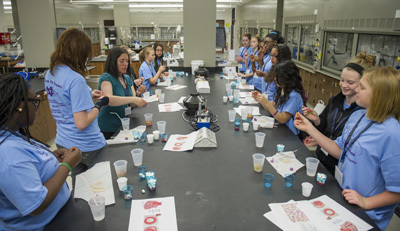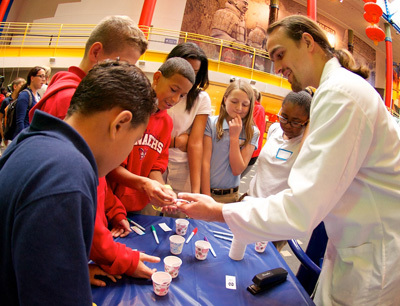Field Trips & Classroom Visits
Group field trips to the DNA Learning Center are available! We offer a variety of activities here at the DNA Center as well as a few options that can be brought to your classroom by our instructor(s). Our program accommodates a variety of needs whether large group or small, school group or other organization (after-school club, girl/boy scouts, etc.), elementary or high school (grades 5-12). Affordable rates are quoted based on group size and discounts are available. To learn more and schedule a field trip reservation please complete this form or contact AsstDNAcenter@nd.edu with additional questions.


We are excited to offer the following activities that can be combined or there is always a possibility we can create specialized activity for your group based on your interest. If you don't see something that meets your needs on this list, please contact us!
Extract your own DNA
See your DNA in action! Students extract their own DNA using saliva and are able to see the resulting precipitant DNA (without a microscope). It enables DNA to become something real and tangible. Students get to keep their own samples! This is a shorter activity that works well in conjunction with other lab activities and is often part of a classroom visit.
DNA Forensics
The Leprechaun has been kidnapped! Students serve as forensic experts by solving a fictitious crime using DNA fingerprinting. This activity can be completed in approximately 1 hour and works well in conjunction with visits to other activities on campus such as campus tours.
Building DNA models
Students are able to build (and take home) their own model of DNA that creates the double helix shape and contains the different bases and parts of the backbone. This is often done in your classroom setting and works best for younger students.
Enzymes
Apples to Applesauce! Students learn the fundamentals of how a science experiment is structured by working with enzymes and observing their effect on foods. This is a shorter activity and can combined with DNA Extractions and/or DNA Forensics.
GMO food modification
Students are able to test a food sample of their choice to determine if genetic modifications were made to the food sample. Analyzing the food sample with DNA isolation, PCR amplification, and gel electrophoresis completes this activity. This activity takes approximately 3 hours to complete with time for other activities between various steps.
Mitochondrial Sequencing
Learn about your ancestry! This is a two-part lab. The first part is completed in the lab and includes isolation of DNA from your own saliva sample and preparing the sample for amplification. The second part can be completed in the lab or in your own classroom (each student must have access to a computer). Sequenced DNA is analyzed and interpreted by each participant with the help of our instructor. Part one takes approximately slightly over an hour (depending on the size of group) and part two takes approximately 30 minutes in the classroom or lab.
PTC Phenotyping and Genotyping
The bitter truth! This “taste testing” lab allows students to learn about phenotypes and genotypes. It also introduces the idea of complex genetics, moving beyond simple Mendelian inheritance patterns and traits. This activity takes approximately 3.5-4 hours depending on group size but has breaks built in for other activities.
Muscle Predisposition Genotyping
Sprinter or Endurance? This lab allows students to learn about genotypes and what genetic predispositions really mean. Students analyze their own DNA to see what their muscle predisposition is based on genotype alone. This lab also introduces the complexities of genetic and environmental interaction. This activity takes approximately 3.5-4 hours depending on group size but has breaks built in for other activities.
Alu Genotyping
This lab allows students to genotype themselves for a common DNA fragment that is part of a human "jumping gene". The frequency of this genotype varies across different populations and allows students to form hypothesises and think about population genetics. This activity can be completed in 2.5-3 hours depending on the size of group and has time built in for other activies.
DNA Barcoding
Plants and their DNA! This is a two-part lab. The first part, performed in the lab, involves DNA isolation of a plant of choice, amplification and preparation of a reaction for sequencing. The second part involves bioinformatically analyzing and interpreting the sequence results which can be done in the lab or in the classroom (each student must have access to a computer). Part one takes approximately 1.5 hrs and part two takes approximately 30 minutes in the classroom or lab.